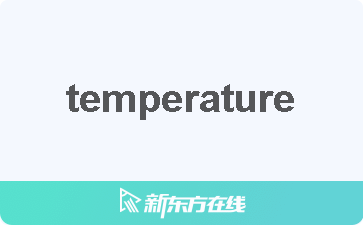- 雅思资讯
- 雅思备考
- 雅思试题
- 互动辅导
新东方-柯林斯雅思备考词典
temperature
[NOUN]

temperatures
1. [C, U 有变体名词] 温度
The temperature of something is a measure of how hot or cold it is.
双语例句
例:Winter closes in and the temperature drops below freezing.
冬天来临,气温降至冰点以下。
例:The temperature soared to above 100 degrees in the shade.
阴凉处的温度猛增到100度以上。
例:Coping with severe drops in temperature can be very difficult.
应付大幅度降温可能很困难。
2. [U 不可数名词] 体温(正常体温约为37摄氏度)
Your temperature is the temperature of your body. A normal temperature is about 37°C.
双语例句
例:His temperature continued to rise and the cough worsened until Tania finally persuaded him to see a doctor.
他的体温持续升高且咳嗽加重,直到塔妮娅最终说服了他去看医生。
3. [C 可数名词] (特定场合的)氛围
You can use temperature to talk about the feelings and emotions that people have in particular situations.
双语例句
例:There's also been a noticeable rise in the political temperature.
政治气氛也明显升温。
NOUN. 名词
run a temperature
1. 发烧
If you are running a temperature or if you have a temperature, your temperature is higher than it should be.
双语例句
例:He began to run an extremely high temperature.
他开始发高烧。
take someone's temperature
1. 量某人的体温
If you take someone's temperature you use an instrument called a thermometer to measure the temperature of their body in order to see if they are ill.
双语例句
例:He will probably take your child's temperature too.
他可能也会量你孩子的体温。